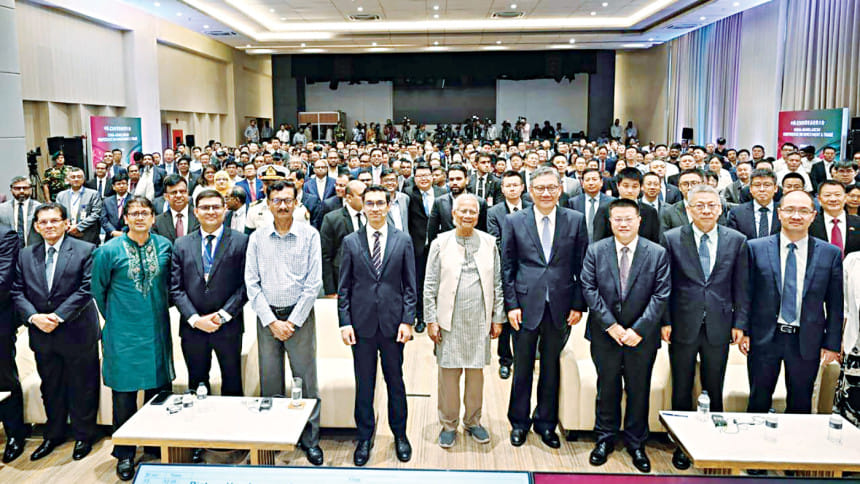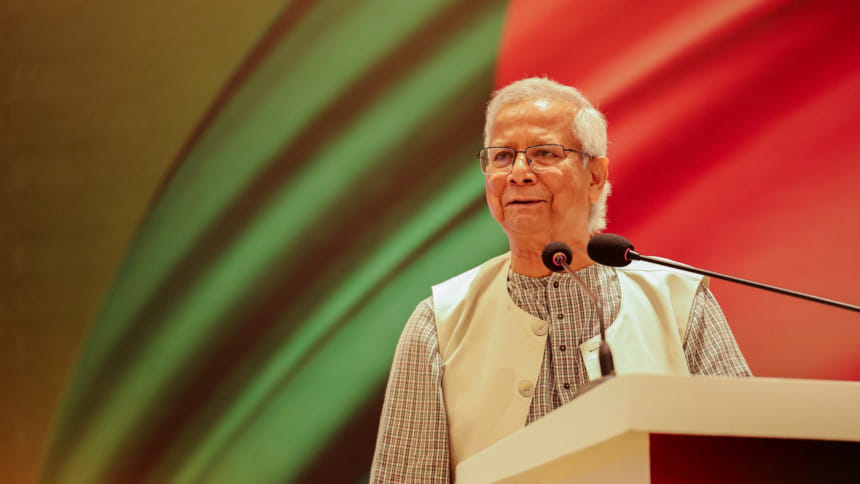We want to be your partner
Chief Adviser Prof Muhammad Yunus yesterday said that large-scale Chinese investment in Bangladesh can be a game changer for the country’s economy.
“Chinese companies are the masters of manufacturing in the globe, and we want to be your partner,” Yunus said while inaugurating the China-Bangladesh Conference on Trade and Investment.
The daylong event was organised by Bangladesh Investment Development Authority (BIDA) with assistance from the Bangladesh Economic Zones Authority (Beza) and the Chinese government, at the BIDA office in the capital.
China’s Commerce Minister Wang Wentao spoke there as special guest.
Yunus said tens of millions of young Bangladeshis desperately need good jobs to express the skill and tenacity they have in making a mark in history.
“Bangladesh stands on the cusp of a transformative era. Our interim government has been steadfast with implementing reforms aimed at enhancing the investment climate, streamlining regulatory frameworks, and ensuring a conducive environment for business operations,” the chief adviser said.
These efforts are designed to attract foreign direct investment, stimulate economic growth, and create employment opportunities for the youth, he added.
Yunus also said the conference is a historic moment for Bangladesh, as this year marks the 50th anniversary of the countries’ enduring friendship.
He said that the gathering marks a significant milestone in the relationship and growing economic partnership between the two countries. The largest-ever Chinese business delegation has been visiting Bangladesh, comprising over 150 investors and business leaders representing scores of companies, including some of the largest in China.
“We have to build a future which can touch the sky. That’s the potential we have together,” the chief adviser said.
Yunus said a couple of months ago, during his visit to Beijing, he requested Chinese President Xi Jinping to encourage companies of his country to invest in Bangladesh. “I’m honoured that the president has followed up on his word.”

For many years, Bangladesh has been touted as a strategic location — at the heart of South Asia — with a dynamic workforce, positioning it as an ideal destination for investment.
“Yet, for decades, we have failed to attract foreign direct investment. Scores of economic zones were developed, but they remain empty. In many places, they are being used for cattle grazing. Widespread corruption, misrule, and brutal dictatorship drove away potential investors.
“The July uprising led by young people brought an end to those days. They committed to creating a new Bangladesh, Yunus said, adding, “So please be part of our history. Make a history for this nation with us.”
The interim government, which took over after the uprising, has restructured BIDA as an agency that means business.
“I invite you to explore the extensive opportunities that Bangladesh offers — from textiles and garments to pharmaceuticals, agro-processing, fisheries, jute, as well as information technology,” the chief adviser said.
“I urge Chinese investors to make Bangladesh their home and their production hub. Our young people are ready to accept that challenge.”
Yunus also stressed the need for reviving the lost glory of jute and increasing its use to strengthen the country’s economy.
“When you talk about jute, it is an emotional issue for Bangladesh. This is a unique country, which produces enormous natural fibres over many years,” he said.
He also recalled the lost glory of Muslin, which was one of the most valuable fabrics on the planet.
At the conference, Yao Wen, Chinese ambassador to Bangladesh, said the visit of the largest business delegation will write a new chapter in collaboration, deepen ties, and take partnership to a new height.
Encouraging foreign investment has been a key focus for Bangladesh’s interim government. Since its formation, around 20 Chinese companies have entered investment agreements with Bangladeshi partners, collectively committing over $400 million.
Additionally, four days ago, the first shipment of premium-quality mangoes was successfully exported to China. Looking ahead, there is optimism that more top-tier Bangladeshi agricultural products, such as jackfruit and guava, will soon reach the Chinese market, delivering real benefits to the people of both nations.
Among others, Cao Derong, president of China Chamber of Commerce of Import and Export of Foodstuffs, Native Produce and Animal By-Products; Liu Chun, vice-president of China Chamber of Commerce for Import and Export of Machinery and Electronics Products; Zhang Xian, vice-president of China Chamber of Commerce for Import and Export of Textiles; and Kong Linghui, vice-president of China International Chamber of Commerce for the Private Sector; spoke at the programme.
Chowdhury Ashik Mahmud Bin Harun, BIDA executive chairman, moderated the event and its Head of Business Development Nahian Rahman Rochi made a presentation.
Meanwhile, during a meeting later in the day with the chief adviser at Jamuna, Chinese minister Wentao said his country was ready to extend cooperation with Bangladesh in trade and commerce, with a particular focus on agriculture, jute, marine fisheries, and research, reports BSS.
“The Chinese companies that have come with me are excited. You expressed the direction of Bangladesh’s future development. The Chinese companies told me that they are now more confident about investing in Bangladesh after your initiatives,” Wentao told Yunus.
LondonGBDESK//



Comments are closed.